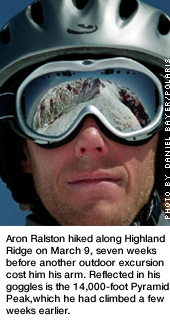Saturday October 16, 02:59 AM
Climber who cut off his hand hails "miracle"
By Nicole SpiridakisWASHINGTON (Reuters) - Aron Ralston, the Colorado climber who saved his life by cutting off his own hand after he became trapped under a boulder last year, calls the experience a "miracle and a blessing."
Stranded in a hidden Utah canyon for six days, Ralston thought he would die and even videotaped a farewell to his parents, sister and friends as he languished, his right arm wedged behind a massive rock. "I will die here," Ralston recalls in his memoir "Between A Rock and a Hard Place," published last month. "I will shrivel up, slumping here with my arm trapped in this place, when dehydration decides to stop toying around and finally kills me."His experience and how he defeated those seemingly impossible odds garnered international media attention and gave him new purpose in life.
"The public and media attention has given the story an ample audience to do the work I think it was brought to me to do," he said in an interview.
"I look at what happened to me as a miracle and a blessing and I therefore feel it a duty, even an obligation, to share it."
DECAYING ARM
At the time, his situation looked anything but blessed. Ralston, 28, an avid outdoorsman living in Aspen, Colorado, was climbing in April 2003 in Canyonlands National Park in central-eastern Utah.
That afternoon he was making his way down to a ledge in a narrow canyon when a boulder fell towards him. He tried to protect himself by throwing his arms up. The boulder crashed down, pinning his right arm from the wrist down. He tried frantically to free himself without success. As day waned, Ralston cursed himself, realising no one knew where he was.
"I violated the prime directive of wilderness travel in failing to leave a detailed trip plan," he wrote later. "I am alone in a predicament that could very shortly prove to be fatal."
On the sixth morning of his entrapment, exhausted from not sleeping and severely dehydrated, Ralston saw that his trapped hand was beginning to decay. Disgusted and agitated, he pulled on it repeatedly, trying to force it from his body.
Then he was struck by a realisation: He could break his arm by angling his body to snap the bones and use his dull pocket knife to saw through tendon and muscle.
Ignoring the excruciating pain, Ralston carefully severed nerves, muscle and artery of his right arm just above the wrist.
Wrenching free from the rock, he wrote, was the most intense feeling of his life.
"I was really just stuck there thinking I was a dead man for six days, but then that epiphany changed everything," Ralston recalled.A LIFE IN THE MOUNTAINS
Ralston credits his education as a mechanical engineer, outdoor experience and training in search and rescue for his survival.
Once free, he still had to rappel down a cliff and hike 8 miles (13 km) to reach a trailhead and the hope of rescue. Friends and family had searched for him for days, alerting authorities who were also on the lookout.
With just a mile (1.6 km) to go -- a mile he knew he was too drained to hike -- he was picked up by a rescue helicopter and flown to a hospital in Moab, Utah.
Ralston's physical recovery came in stages over about four months, during which he underwent five surgeries and spent 17 days in the hospital. He went through challenging rehabilitation therapy to learn to live with one hand.
Within two weeks of his last surgery, Ralston returned to his active lifestyle, running at elevations of 8,000 feet (2,438 m) and backpacking at 12,000 feet (3,657 m). He ran a 100-mile (160-km) ultramarathon last year and designed a one-of-a-kind prosthetic device to use while rock climbing.
Finishing his book means he now has more time to focus on his quest to become the first person to solo-climb all 59 of Colorado's 14,000-foot (4,267-m) peaks in winter.
"At this point my physical fitness matches or is even better than before the accident," Ralston said.FINDING PURPOSE THROUGH LOSS
Rather than see his entrapment as an unfortunate accident, Ralston views it as an opportunity. He is touring to promote the book and giving motivational talks.
What compels him to tell his story again and again are the "dozens upon dozens" of personal stories people share with him.
"I feel I'm fulfilling a sense of greater purpose in my life," Ralston said. "I get feedback from people about how the story has helped them, has inspired them to take on new challenges, to perhaps see a different way of living.
"It may even help people find a way to cope with pain or surviving loss," he said.
He now feels capable of nearly anything.
"Day to day I have this really deep reference point of the euphoria, what it feels like to really, deeply enjoy being alive," Ralston said. "Nothing is impossible. I know that we each have the capacity to go farther than we think we can go, to do more than we think we can do.
"I've always believed that you can create your own reality, and this (experience) has confirmed this belief."




No comments:
Post a Comment